Acronym DANU
- Doclean Academy of Sciences and Arts, with the native acronym DANU
Danu is an ancient Scythian word meaning "river". The commonly proposed etymology of the names of the Danube River, Dnieper River, Dniester River, Don River, and Donets River.
Danu may also refer to:
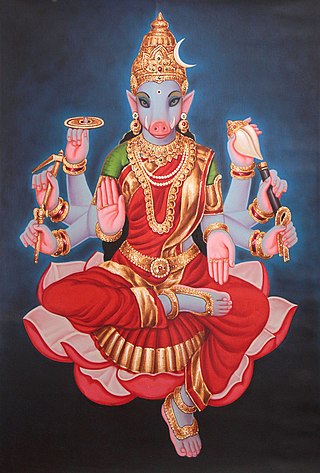
A goddess is a female deity. In many known cultures, goddesses are often linked with literal or metaphorical pregnancy or imagined feminine roles associated with how women and girls are perceived or expected to behave. This includes themes of spinning, weaving, beauty, love, sexuality, motherhood, domesticity, creativity, and fertility. Many major goddesses are also associated with magic, war, strategy, hunting, farming, wisdom, fate, earth, sky, power, laws, justice, and more. Some themes, such as discord or disease, which are considered negative within their cultural contexts also are found associated with some goddesses. There are as many differently described and understood goddesses as there are male, shapeshifting, or neuter gods.
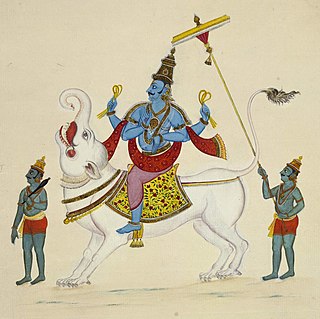
Varuna is a Hindu god, associated with the sky, oceans and water. In the Vedic scriptures, he is paired with the god Mitra and is the lord of Ṛta (justice) and Satya (truth). Varuna is also mentioned as an Aditya, the sons of the goddess Aditi.
In Irish mythology, *Danu is an obscure figure of Irish mythology, whose sole attestation is in the genitive in the name of the Tuatha dé Danann. Though primarily seen as an ancestral figure, some Victorian sources also associate her with the land.

Anu or Ana is the name of a goddess mentioned briefly in Irish mythology.
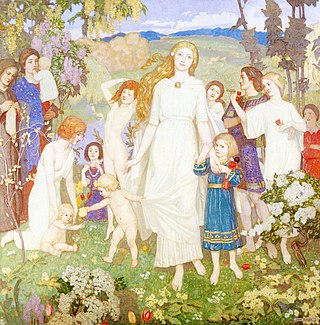
Brigid or Brigit, also Bríg, is a goddess of pre-Christian Ireland. She appears in Irish mythology as a member of the Tuatha Dé Danann, the daughter of the Dagda and wife of Bres, with whom she had a son named Ruadán.
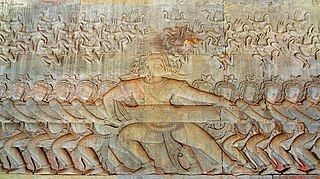
Asuras are a class of beings in Indic religions. They are described as power-seeking demons related to the more benevolent Devas in Hinduism. In its Buddhist context, the word is sometimes translated "titan", "demigod", or "antigod".

Saraswati is the Hindu goddess of knowledge, music, art, speech, wisdom, and learning. She is one of the Tridevi, along with the goddesses Lakshmi and Parvati.

Proto-Indo-European mythology is the body of myths and deities associated with the Proto-Indo-Europeans, speakers of the hypothesized Proto-Indo-European language. Although the mythological motifs are not directly attested – since Proto-Indo-European speakers lived in preliterate societies – scholars of comparative mythology have reconstructed details from inherited similarities found among Indo-European languages, based on the assumption that parts of the Proto-Indo-Europeans' original belief systems survived in the daughter traditions.
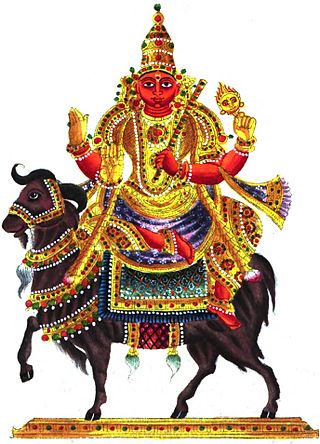
Mangala is the personification, as well as the name for the planet Mars, in Hindu literature. Also known as Lohita, he is the deity of anger, aggression, as well as war. According to Vaishnavism, he is the son of Bhumi, the earth goddess, and Vishnu, born when the latter raised her from the depths of the primordial waters in his Varaha avatar.

Ushas is a Vedic goddess of dawn in Hinduism. She repeatedly appears in the Rigvedic hymns, states David Kinsley, where she is "consistently identified with dawn, revealing herself with the daily coming of light to the world, driving away oppressive darkness, chasing away evil demons, rousing all life, setting all things in motion, sending everyone off to do their duties". She is the life of all living creatures, the impeller of action and breath, the foe of chaos and confusion, the auspicious arouser of cosmic and moral order called the Ṛta in Hinduism.

Deva means "shiny", "exalted", "heavenly being", "divine being", "anything of excellence", and is also one of the Sanskrit terms used to indicate a deity in Hinduism. Deva is a masculine term; the feminine equivalent is Devi. The word is a cognate with Latin deus ("god") and Greek Zeus.
Anu is a Mesopotamian god.
Danu is a Hindu primordial goddess. She is mentioned in the Rigveda to be the mother of the eponymous race of Danavas. The word Danu described the primeval waters that this deity perhaps embodied. In later Hinduism, she is described as the daughter of the Prajapati Daksha and his spouse Panchajani, and the consort of the sage Kashyapa.

The Samudra Manthana is a major episode in Hinduism that is elaborated in the Vishnu Purana, a major text of Hinduism. The Samudra Manthana explains the origin of the elixir of eternal life, amrita.

Raktabīja is an asura in Hinduism. According to the Puranas, he fought with Shumbha and Nishumbha against the goddesses Kali and Chandi, both forms of Durga. Raktabīja secured from Shiva a boon according to which if one drop of blood from his body fell on the battlefield, many Raktabījas would arise from the blood and fight the enemies. Each of these Raktabījas would also be like the others in the matter of strength, form, and weapons.
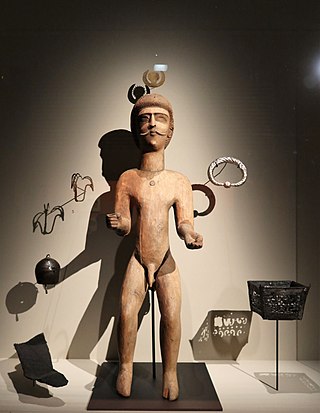
Mitra is a Hindu god and generally one of the Adityas, though his role has changed over time. In the Mitanni inscription, Mitra is invoked as one of the protectors of treaties. In the Rigveda, Mitra appears primarily in the dvandva compound Mitra-Varuna, which has essentially the same attributes as the god Varuna alone, e.g. as the principal guardian of ṛtá "Truth, Order". In the late Vedic texts and the Brahmanas, Mitra is increasingly associated with the light of dawn and the morning sun. In the post-Vedic texts – in which Mitra practically disappears – Mitra evolved into the patron divinity of friendship, and because he is "friend", abhors all violence, even when sacred.

Ganga is the personification of the river Ganges, who is worshipped by Hindus as the goddess of purification and forgiveness. Known by many names, Ganga is often depicted as a fair, beautiful woman, riding a divine crocodile-like creature called the makara. Some of the earliest mentions of Ganga are found in the Rigveda, where she is mentioned as the holiest of the rivers. Her stories mainly appear in post-Vedic texts such as the Ramayana, Mahabharata, and the Puranas.

In Hindu mythology, the danavas are a race descending from Kashyapa and his wife Danu, a daughter of the progenitor god, Daksha. It is mentioned that there are one hundred danavas.
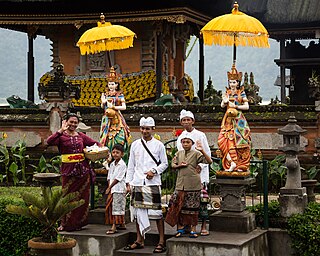
Dewi Danu is the water goddess of the Balinese Hindus, who call their belief-system Agama Tirta, or belief-system of the water. She is one of two supreme deities in the Balinese tradition.
*Deh₂nu- is a proposed Proto-Indo-European goddess of rivers based on the Vedic goddess Dānu, the Irish goddess Danu, the Welsh goddess Dôn and the names of the rivers Danube, Don, Dnieper, and Dniester. Mallory and Adams however note that while the lexical correspondence is probable, "there is really no evidence for a specific river goddess" in Proto-Indo-European mythology "other than the deification of the concept of ‘river’ in Indic tradition". Some have also proposed the reconstruction of a sea god named *Trih₂tōn based on the Greek god Triton and the Old Irish word trïath, meaning "sea". Mallory and Adams also reject this reconstruction as having no basis, asserting that the "lexical correspondence is only just possible and with no evidence of a cognate sea god in Irish." It is also linked to Ossetian Donbettyr who is offered “three scones with honey” for turning their waterwheels. Donnán of Eigg is considered a possible Christianized version of this deity.